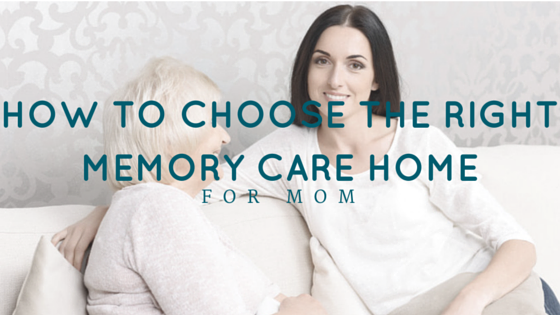
Worldwide, nearly 50 million men and women suffer from some form of dementia including Alzheimer's disease, and every year, nearly 8 million more are diagnosed. This means that every year, tens of thousands of caregivers—often adult children—go on the hunt for a memory care home they feel is the best choice for their aging loved one.
Choosing a memory care home is a tremendous responsibility, and given the wide array of choices available today, making sure the home you select is the best one can seem almost as impossible as providing the care yourself. If you're starting your own search, there are four highly important factors you need to consider when choosing a memory care facility for your parent.
1. Certifications and Licensure
Obviously, this should be first on anyone's list. Patients with Alzheimer's and other types of dementia require skilled care from healthcare providers who have the educational background and training to provide an array of care services focused on memory and cognition. Be sure to ask about the credentials of the staff who will be providing care for your loved one, as well as proof of the community’s licensure. Also be sure to ask if the people who will be providing direct care have received training in caring for patients with memory issues. Several agencies and schools offer memory care curricula, and certification in these skills is becoming more and more common.
2. Staff-to-resident Ratio
It just makes sense. When a larger staff is responsible for a smaller patient population, patients benefit from more individualized attention. That's why staff-to-patient ratios can provide an effective measurement when comparing one memory care facility to another. When asking about ratios, be sure you receive information about the staff members who will be directly involved in the care of your loved one: for instance, ask how many patients a single registered nurse will be responsible for on any given shift. When talking about ratios, some memory care facilities may include ancillary staff members like cleaning or kitchen staff to give the appearance of a better ratio than the actual proportion of professional staff to residents.
3. Safety Features
People with dementia tend to wander, so choosing a memory care home with safety features like alarmed doors or closed-circuit monitoring systems for hallways and public areas like outside patios is important to limiting unintentional exits. Also look for handrails in hallways and bathrooms, wide halls that are easy to navigate, and signage that helps patients locate important areas like dining rooms, therapy rooms and other non-residential spaces to avoid the frustration of becoming lost.
4. Décor
Although it may not seem as important as the other three factors in this list, multiple studies have shown décor and environment play critical roles in helping Alzheimer's patients adjust to their new residences and can even help slow the progression of the disease and its symptoms. A community that cultivates a soothing and relaxing environment reduces stress and anxiety that can often lead to more significant episodes of confusion—as well as higher levels of general unhappiness and increased risk for chronic diseases. Elements like color, non-institutional furnishings and even plants and aquariums have been shown to reduce stress and unhappiness among residents with Alzheimer's disease and other types of dementia. Although caring for people with dementia demands some design features to prevent injuries and wandering, look for memory care facilities that look and feel more “homelike” and less like a medical facility in order to help your loved one feel comfortable and at home in their new environment.
Choosing a memory care home for a loved one can seem overwhelming to even the most organized person. Taking your time to really get a "feel" for the homes you're considering—even making a list for comparison purposes—can help you feel more confident in your decision. With the right caregiving situation in place, you can finally enjoy the peace of mind that comes from knowing your loved one is receiving the very best care.












